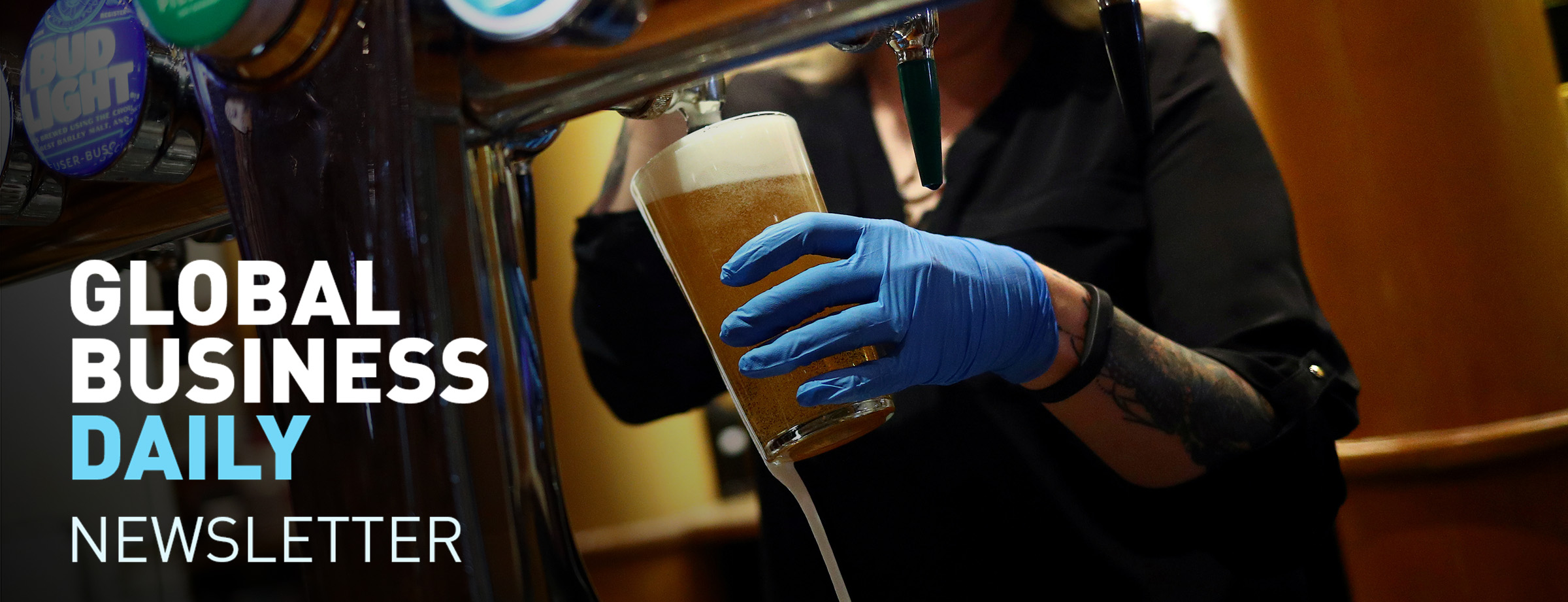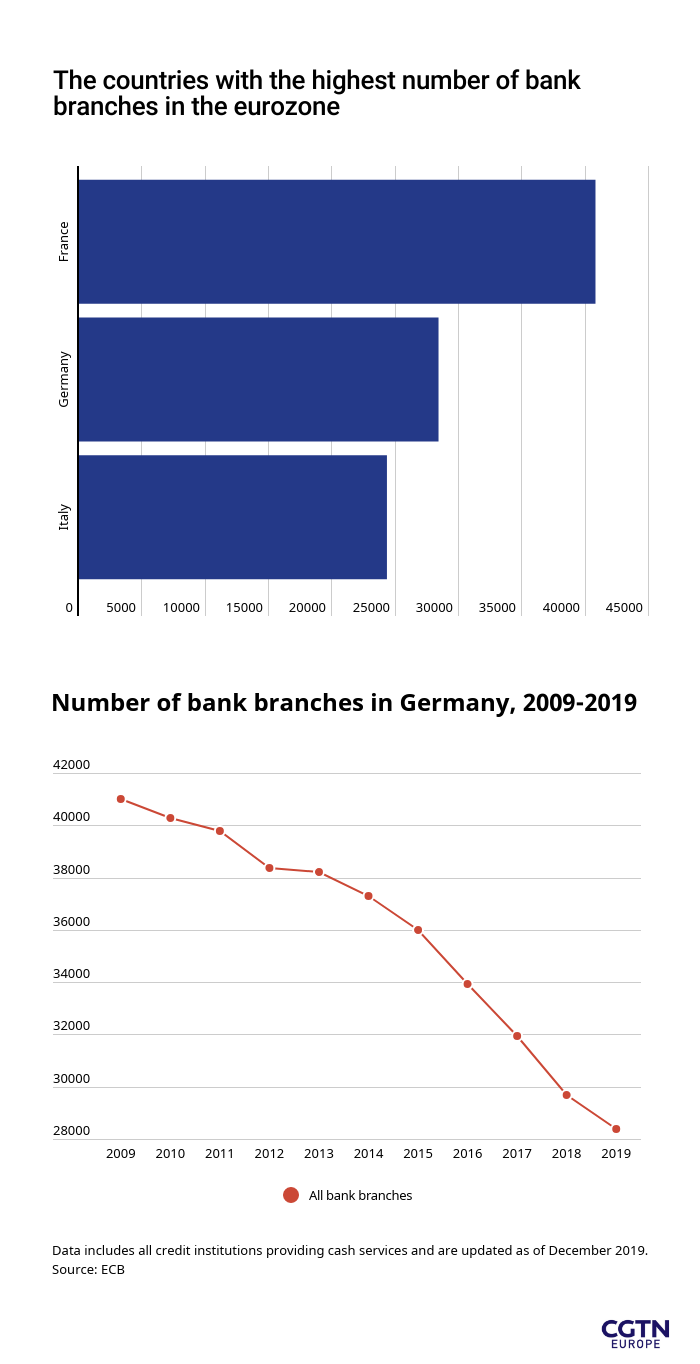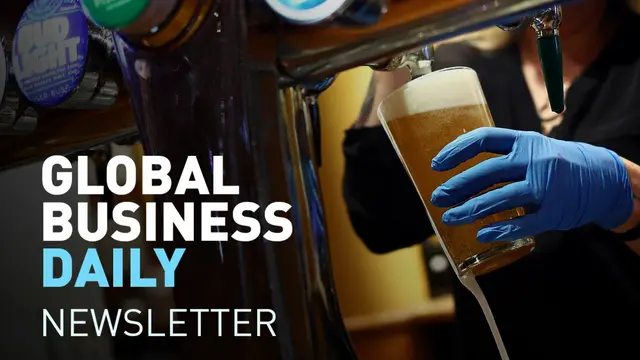"Coronavirus has further changed the demands placed on advisory services and the branch business."
These are the words Philipp Gossow, chief operating officer Germany at Deutsche Bank AG, used to explain the bank's plans to close one in five of its branches in Germany.
"Even customers who were previously not very familiar with online banking are now doing many simple banking transactions from home on their computer or iPad," he said.
It's a big switch for Germans, who have so far been quite resistant to digital change. But across Europe, the number of physical bank branches has steadily decreased in the last few years. According to the European Central Bank, in 2019 the number of bank branches in EU countries declined by an average of 6.3 percent, a change that can only be accelerated by the pandemic. Our graph today shows how this number has declined in Germany in the last 10 years.
As cases rises in Europe, the UK has announced new COVID-19 restrictions which could last for the next six months, including curfews for its pubs, bars and restaurants, causing concerns in the sector. Prime Minister Boris Johnson also asked office workers to work from home where possible.
Also working from home are Spaniards. The government just agreed with business leaders that employers should pay the expenses for homeworking for their employees.
In other news, the Tiffany-LVMH trial has been set for early January – a small victory for the U.S. jeweler, which had warned that a longer timeline could force it to agree to a price lower than the $16.6 deal agreed before the pandemic. Our interview today gives more insight into the lawsuit.
Enjoy reading,
Giulia Carbonaro
Digital correspondent
**P.S. Did someone forward this to you? **
Sign up here

As the number of COVID-19 cases rises again in the UK, Prime Minister Boris Johnson is urging people to work from home whenever possible, making a U-turn from his recent attempts to get Britons back to the office. The UK government has set out new restrictions including curfews for pubs, bars and restaurants , which will be forced to close at 10pm.
Deutsche Bank plans to close 20 percent of its branches in Germany "as quickly as possible" in an attempt to save costs and adapt to new customer habits emerging during the pandemic. The reduction from 500 to 400 branches will take place mostly in urban locations.
Premier Inn owner Whitbread announced it will cut 6,000 jobs and reduce working hours for staff because demand remains way below last year's levels despite an increase in bookings for its hotels during the summer.
The Spanish government has agreed with trade unions and business leaders that employers in the country will cover the cost of homeworking expenses . "It was fundamental to regulate remote working to protect the rights of workers," said Deputy Prime Minister Pablo Iglesias in an interview with state-owned TV channel TVE. The draft bill still needs to receive approval from the cabinet.
Poland's clothing and footwear retailers LPP and CCC , which had ambitions to become global fashion brands like HM and Zara, are switching focus back to eastern Europe and plan to open more physical stores in the region , seizing the opportunity created by Western brands shutting stores in eastern and central Europe.
Microsoft has bought private gaming company ZeniMax for $7.5bn , the company's third largest acquisition after LinkedIn and Skype. The gaming studio was behind popular titles such as
Fallout
, Doom
, The Elder Scrolls
, Quake
and Starfield
. With this move, Microsoft is betting on original content for the gaming sector, which already has revenues higher than those of Hollywood and the music industry combined.
A U.S. court has ruled to fast-track Tiffany's lawsuit against LVMH , setting a trial date on 5 January 2021. The U.S. jewelry company is suing the world's largest luxury conglomerate for pulling out of a deal that would have had LVMH acquiring Tiffany for $16.6bn. Tiffany's concerns are that a long process will force it to lower its value and agree to a price reduction.
Italy's bonds yields tumbled after the regional election results on Monday evening. The country's borrowing costs lowered six basis points to around 0.88 percent thanks to the perceived reduction in political risk after results confirmed that right-wing opposition leader Matteo Salvini was losing support.
The founder of the U.S. electric truck maker Nikola, Trevor Milton, is stepping down as executive chairman after fraud allegations were made by a short seller against the company. Shares in the company fell by almost 30 percent on Monday, but the biggest shareholder remains Milton.
**Shares in HSBC plunged to their lowest levels since 1995 **after the bank was named on media reports of alleged suspicious transfers. HSBC declined to comment on the suspicious activities.
WATCH: While the meat industry is under fire from environmentalists and climate activists, this French butcher is compiling a dossier to send to UNESCO to prove that preparing meat 'à la Française' should be recognized as an art.
01:40
Sebastian Huber, luxury researcher at Lucerne University of Applied Sciences and Arts, spoke to CGTN Europe about the Tiffany-LVMH suit.
How much weight does LVMH have in arguing that it couldn't proceed with the deal because the French government is putting the brakes on it?
I guess it could be both ways. We heard rumors that it actually went the other way round, that LVMH was looking for support by the government in order to come out of the deal. I think it's unlikely the French government would pressure a French group to grow abroad. But what is, of course, significant is that if there were limitations for Tiffany to keep on doing business in the States, if they were belonging to a French group, that could have a significant impact on the perspectives of that deal. So I think there are negotiations on the table, on the government side but also still between the two parties in this deal. Therefore, I think the French government does have a role to play in dealing with the U.S. trade regulations.
On the one hand, LVMH is attempting to pull out of the deal – but on the other hand, it's still in talks with the European Commission's anti-trust about approving it...
I guess it's about having as many options on the table as possible, likely in the favor of the group. The two processes are at very different speeds. They coincide now, but the approval by the EU Commission is no certain thing, and it's a lengthy process. If I were at LVMH Group, I wouldn't put at risk the approval that we might be getting, in order to have that as an option on the table if the deal does go through. So I would definitely keep as many options there as possible – and then, depending on what the court ruling is, try to steer it in my favor.
How much weight does Bernard Arnault have by accusing Tiffany's of paying out dividends during the pandemic and of general mismanagement?
In these times, there's a lot of focus on cash, no doubt – in the luxury industry just as much as in other industries. And so honoring a deal or an agreement that was made last November by paying out certain dividends throughout an environment where fundamentals have changed probably would anger many deal-makers, so I can sort of understand the anger there. And, of course, you know, luxury brands tend to have very strong personalities at their heads. So, yeah, I think Bernard Arnault has a point here.

 简体中文
简体中文



